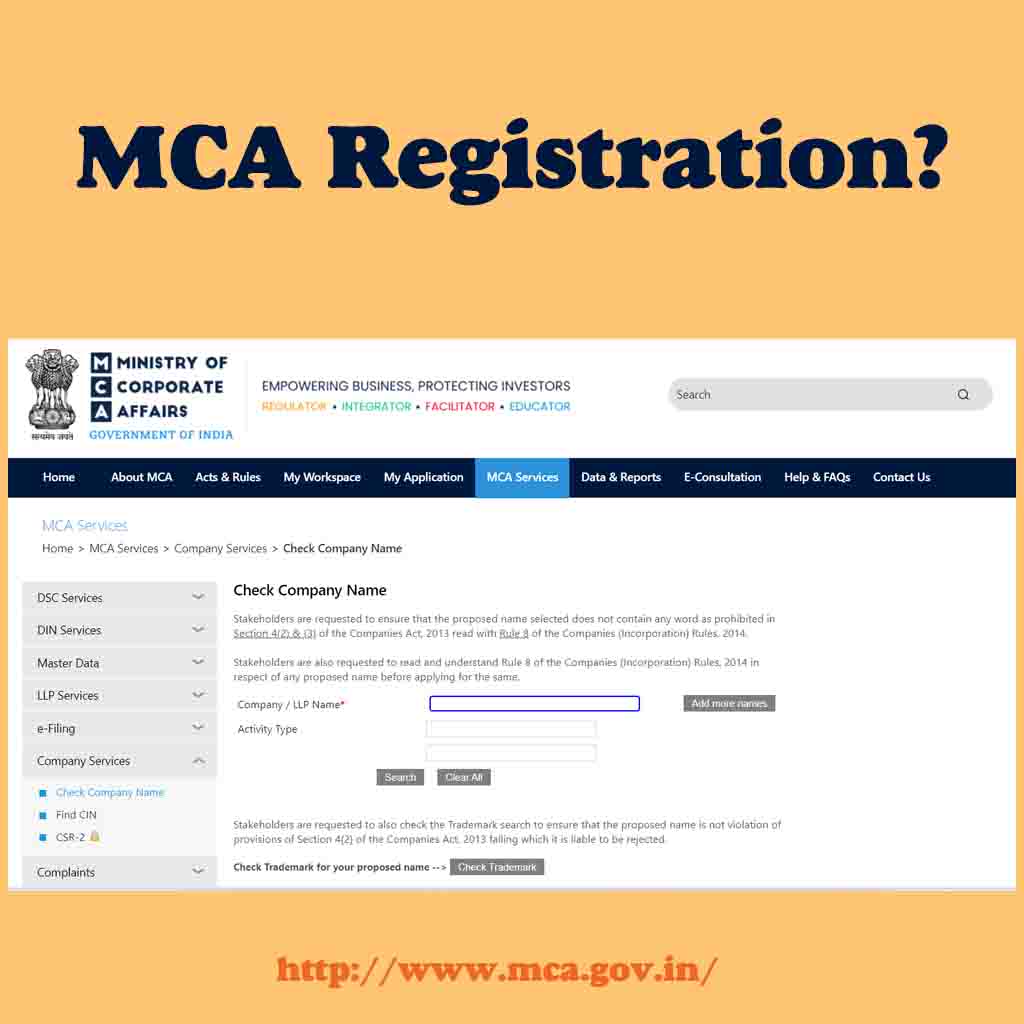
Understanding MCA Registration: A Guide to Compliance and Formalizing Your Business
In the realm of business, adhering to legal requirements and regulations is crucial for establishing credibility, gaining access to certain benefits, and ensuring compliance. One important aspect of business registration is MCA registration. In this article, we will delve into the concept of MCA registration, its significance, and the process involved. Whether you are starting a new company or seeking to formalize an existing business, understanding MCA registration is essential to operate within the legal framework.
What is MCA Registration?
MCA stands for the Ministry of Corporate Affairs, which is a government body responsible for regulating and administering corporate affairs in India. MCA registration refers to the process of registering a company or LLP (Limited Liability Partnership) with the Ministry of Corporate Affairs. It involves submitting necessary documents and fulfilling legal requirements to obtain a certificate of registration.
Related Articles
Significance of MCA Registration
- Legal Compliance: MCA registration ensures compliance with the legal framework governing companies and LLPs in India. It demonstrates that the business entity operates within the regulatory boundaries defined by the Companies Act, 2013, and related legislation.
- Credibility and Trust: MCA registration enhances the credibility and trustworthiness of your business in the eyes of stakeholders, including customers, suppliers, investors, and financial institutions. It signifies that your business is recognized and regulated by the government, instilling confidence in potential partners.
- Access to Legal Protection: Registering with the MCA provides legal protection to your business entity. It establishes a separate legal identity for the company or LLP, limiting the personal liability of its directors or partners. This separation ensures that the business’s debts or legal disputes do not directly impact the personal assets of the individuals involved.
- Perpetual Succession: MCA registration ensures the perpetual succession of a company or LLP, meaning the entity can continue to exist even if there are changes in its ownership or management. This feature offers stability and continuity, especially during transitions such as the death or retirement of partners or directors.
- Avail Government Benefits and Schemes: MCA-registered companies and LLPs gain access to various government benefits, incentives, and schemes. This includes access to bank loans, tax incentives, government tenders, and participation in public procurement processes. These advantages can significantly contribute to the growth and development of your business.
Process of MCA Registration
- Obtain Digital Signature Certificate (DSC): The first step in the MCA registration process is to obtain a Digital Signature Certificate (DSC) for the proposed directors or partners. A DSC is required to digitally sign the necessary documents during the registration process.
- Director Identification Number (DIN) Application: Each director or partner must obtain a unique Director Identification Number (DIN) from the MCA. This can be done by submitting the necessary documents and completing the DIN application.
- Name Approval: Choose a unique and appropriate name for your company or LLP and submit it for approval through the RUN (Reserve Unique Name) service. The name should comply with the naming guidelines specified by the MCA.
- Prepare and Submit Incorporation Documents: Prepare the necessary incorporation documents, including the Memorandum of Association (MOA) and Articles of Association (AOA) for a company, or the LLP Agreement for an LLP. These documents outline the company’s objectives, rules, and regulations.
- File e-Forms: Submit the relevant e-Forms, such as SPICe (Simplified Proforma for Incorporating Company Electronically) for company registration or FiLLiP (Form for incorporation of Limited Liability Partnership) for LLP registration, along with the required documents.
- Payment of Fees: Pay the prescribed registration fees based on the authorized capital or contribution of the company or LLP.
- Obtain Certificate of Incorporation: Upon successful verification and approval of the registration application by the MCA, a Certificate of Incorporation will be issued. This certificate serves as proof of registration and includes important details like the company or LLP’s unique registration number.
Do you know?
What is MOA (Memorandum of Association)?
The Memorandum of Association, often referred to as the MOA, is a legal document that serves as the foundation of a company’s constitution. It contains vital information about the company’s objectives, powers, and limitations within which it operates. The MOA acts as a contract between the company and its shareholders, defining their rights and obliga…… Read more here.
Conclusion
MCA registration is a vital step in establishing and formalizing your business entity in India. It ensures legal compliance, enhances credibility, and offers various benefits to registered companies and LLPs. By understanding the significance of MCA registration and following the prescribed process, you can lay a strong foundation for your business and operate within the regulatory framework, fostering growth and success.


